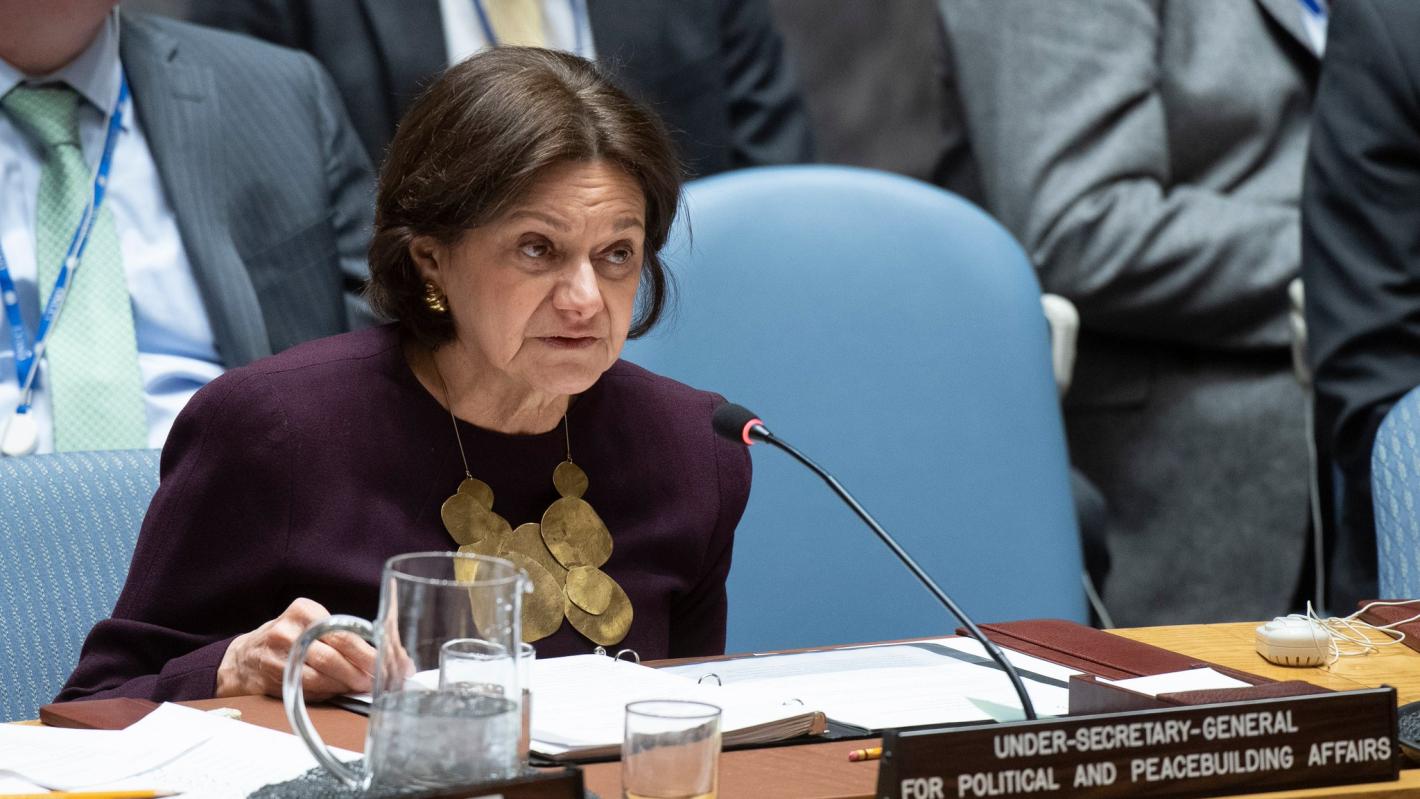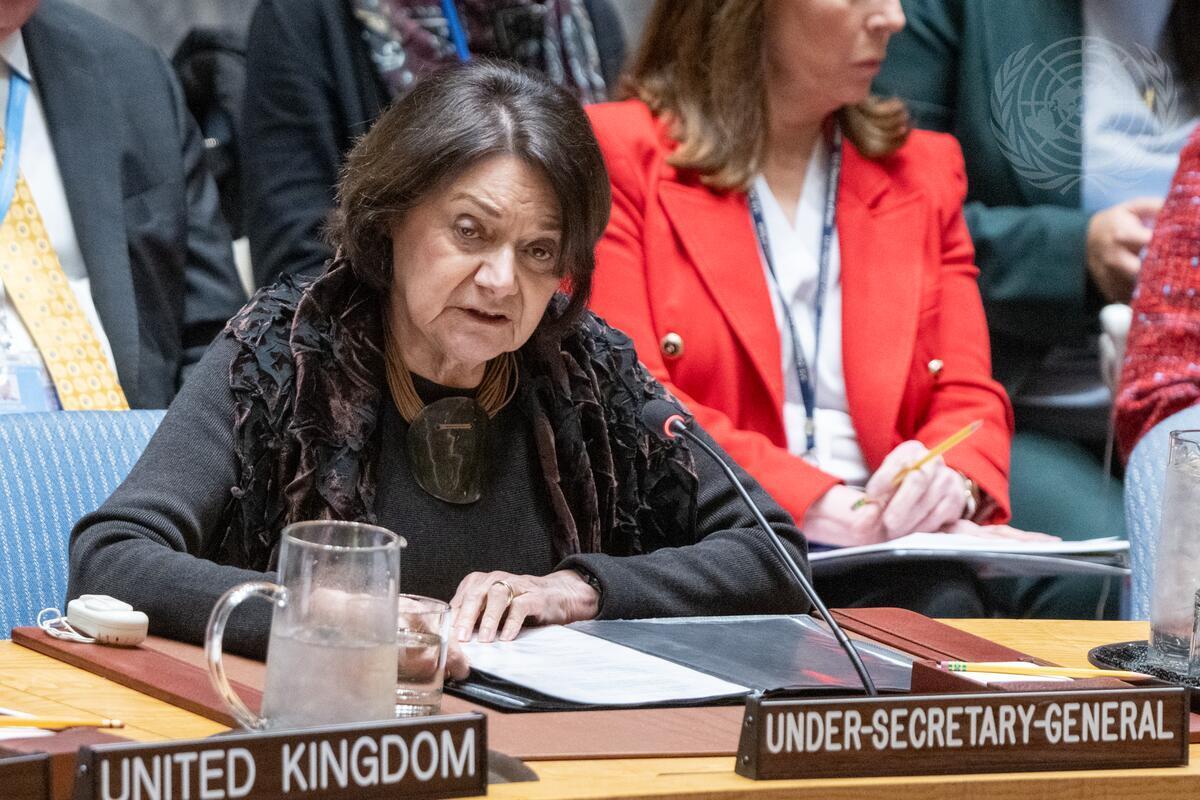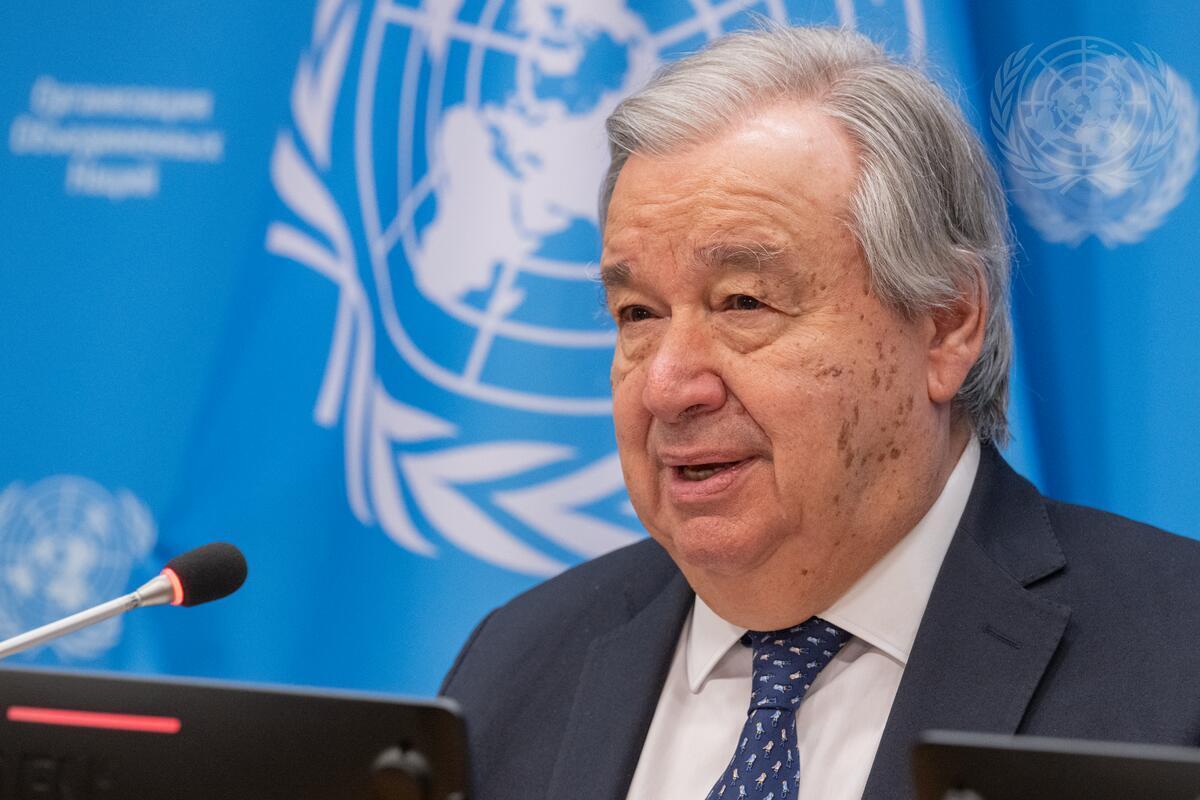Mr. President,
I would like to express condolences for the attacks at the synagogue in San Diego and at the church in Burkina Faso, as well as the previous attacks against religious sites in New Zealand and Sri Lanka. Our sympathy is with the families of the victims. We condemn terrorism in all its manifestations.
I would also like to pay tribute, on behalf of the entire UN family, to Major General Francis Vib-Sanziri, the UNDOF Head of Mission and Force Commander, who passed away suddenly on 19 April. His leadership, dedication and enthusiasm were invaluable in commanding UNDOF under difficult circumstances. He will be remembered for his exemplary career in the service of UN peacekeeping.
We meet today as the United Nations continues to advance efforts to address the continued humanitarian, economic and political crisis in the Occupied Palestinian Territory.
Yet the continuing absence of a political solution to the broader conflict undermines and compounds our efforts.
Under the pressure of violence, settlement expansion, unilateral measures, intra-Palestinian divisions and deepening mutual mistrust, the prospects for a just and lasting peace remains ever more elusive.
Hopes for the realization of a two-state solution continue to be replaced by the rising fears of future annexation. The possibility of establishing a viable and contiguous Palestinian state continues to be eroded by facts on the ground.
The United Nations has repeatedly warned that the conflict cannot be managed in perpetuity. The status quo will only lead to further deterioration of the situation, radicalization on all sides, more suffering and conflict.
Mr. President,
Before addressing recent developments on the ground, I would like to congratulate Prime Minister Shtayyeh on the formation of a new Palestinian government. I wish him every success and urge all Palestinian factions and political leaders to work together, in good faith, to unify Gaza and the West Bank under a single, legitimate Palestinian government.
I also want to congratulate the Israeli people for their democratic general election on 9 April. On 17 April President Rivlin asked Prime Minister Netanyahu to form a new government. We stand ready to continue working with the new government when it is formed.
Mr. President,
The prolonged absence of a political solution to the conflict has coincided with the steady deterioration of the situation in the Occupied Palestinian Territory.
During the reporting period, Israeli authorities advanced at least 2,100 housing units in Area C settlements and issued tenders for some 950 additional units. One of the plans advanced would retroactively regularize, under Israeli law, the illegal outpost of Haresha by incorporating it into the existing Talmon settlement.
Settlements have no legal effect and constitute a violation of international law.
Demolitions and seizures of Palestinian-owned structures also continued across the West Bank, including East Jerusalem. Israeli authorities demolished or seized 37 structures, displacing 49 people, mostly on the grounds of lacking Israeli-issued building permits, which are nearly impossible for Palestinians to obtain.
In addition, on 31 March, the Israeli District Court rejected three appeals challenging demolition orders submitted by Palestinian residents of the Silwan neighborhood of East Jerusalem.
The situation at Jerusalem’s Holy Sites has remained relatively calm in the past month. I would like to take the opportunity of the overlapping holidays of Judaism, Christianity and Islam to wish peace and prosperity for the people of Palestine and the people of Israel, but also to urge sustained calm, particularly in the Holy Sites, which can only be achieved by respecting the status quo and relevant agreements.
Mr. President,
Regrettably, the cycle of violence continues.
On 30 March, Palestinians in Gaza marked the first anniversary of the “Great March of Return” protests, which was commemorated by 50,000 Palestinians demonstrating at the perimeter fence. While the vast majority of protesters remained peaceful, a small number ignored the calls for restraint and engaged in acts of violence against Israel and attempted to breach the fence.
During the reporting period, 7 Palestinians, including 4 children, were killed in Gaza by Israel Defense Forces (IDF) and 1,316 were injured.
I reiterate the previous calls by the UN that children should never be the target of violence nor should they be put at risk of violence or encouraged to participate in violence. I also reiterate the call on Israel that lethal force should only be used in response to an imminent threat of death or serious injury and as a last resort.
During the reporting period, Palestinian militants fired 30 rockets and mortars from Gaza towards Israel. The indiscriminate launching of rockets and mortars towards the Israeli civilian populations is prohibited by international humanitarian law and must immediately cease. Several incendiary balloons were also launched from Gaza into Southern Israel. This must stop. Hamas must also ensure that protests remain peaceful and prevent provocations near the fence, including attempts to breach it.
Meanwhile in the West Bank, three Palestinians were shot and killed by Israeli forces, and 63 were injured, including 18 children.
On 27 March, a 17-year old Palestinian paramedic was shot by the ISF near al-Duheisha Refugee Camp in Bethlehem, and later died of his wounds. The shooting occurred during clashes following two ISF arrest operations in the camp earlier that day.
Settler-related violence also continued during the reporting period. According to OCHA one Palestinian was killed, and 19 were injured or had their property damaged by others. On 3 April, two Israeli civilians opened fire in Nablus, injuring two Palestinians, including a 23-year-old man who died later in hospital.
On 24 April, following the arrest, tying and blindfolding of a 15-year-old Palestinian boy for allegations of stone-throwing, IDF soldiers shot him twice in his lower body as he attempted to escape while still blindfolded. The IDF stated it was responding to "massive stone throwing" and one of the “the rioters” was shot as he tried to flee after being arrested.
In the same period, OCHA recorded 14 Palestinian attacks against Israeli settlers and other Israeli civilians in the West Bank, where Palestinians threw stones at vehicles traveling on roads near Bethlehem, Hebron and Ramallah. One injury and damage to 13 vehicles were reported.
Mr. President,
The reporting period also saw a worsening Palestinian financial crisis. Despite the austerity measures announced and the recent pledges of support by Arab States, the risk of a financial collapse of the Palestinian Authority is growing.
A sustainable resolution of the PA’s funding crisis is urgently required. Both parties should address the causes of the crisis through dialogue, implement their bilateral agreements and avoid taking unilateral actions that undermine stability and security for both Palestinians and Israelis alike.
I urge the members of the Ad Hoc Liaison Committee (AHLC) to use its meeting tomorrow in Brussels to work with Israel and the Palestinian Authority to resolve this crisis that threatens the viability of the Palestinian Authority.
Mr. President,
I would like to turn to the ongoing humanitarian and economic crisis in Gaza and begin by highlighting the plight of women. 70% of all women in Gaza today are unemployed. As a result, female-headed households are more likely to face poverty and food insecurity. Moreover, we know that poverty and lack of economic opportunities are key drivers behind violence against women in Gaza. The United Nations continues to provide assistance to Palestinian women and girls across a broad range of areas but much more needs to be done to ensure that their needs are addressed.
The United Nations is also making important progress on the implementation of a package of urgent humanitarian and economic interventions in order to stabilize the situation in Gaza, prevent an escalation, lift the closures, and support Egyptian-led reconciliation efforts.
Over the past year, nearly USD 110 million for fuel, health, water, sanitation and temporary employment programmes has been raised. The UN and its partners have mobilized nearly USD 45 million that will allow for the creation of approximately 20,000 temporary jobs in 2019.
Since September, approximately USD 4.6 million in support to the Humanitarian Response Plan has contributed to the delivery of essential drugs and the performance of some 9,500 emergency surgeries.
I welcome Qatar’s extension of funding for the UN to procure and deliver fuel to the Gaza Power Plant until June.
In a positive development, on 1 April, Israel extended some areas of the Gaza fishing zone up to 15 nautical miles. I welcome this decision and strongly urge that the rest of the fishing zone, which remains limited to 6 to 12 nautical miles, also be expanded.
As we have repeatedly stated , at its core the crisis in Gaza is political. Significant progress on the lifting of the closures and advancing intra-Palestinian reconciliation remain essential.
I reiterate my call on all Palestinian factions to engage in earnest with Egypt on reconciliation efforts. I also take this opportunity to thank Member States that have supported the implementation of the AHLC projects to date and urge others to contribute to this important effort, including through critical financial support to the Programme Management Unit, as well as for the Humanitarian Response Plan.
Mr. President,
Turning to the situation in the region, Lebanon remains stable, with continued commitment of political actors to dialogue leading to Parliamentary approval of its long-awaited plan to reform the electricity sector. Discussions continue on the 2019 budget, as proposed public sector pay cuts spark protests. Significantly, Minister of Defense Elias Bou Saab and Lebanese Armed Forces (LAF) Commander General Joseph Aoun visited UNIFIL and southern Lebanon on 24 April, with Minister Bou Saab stating that the Lebanese Armed Forces would increase troop deployment in southern Lebanon.
The situation in southern Lebanon and along the Blue Line remained calm. On 2 April, UNIFIL chaired a regular Tripartite meeting attended by senior delegations from the Lebanese Armed Forces and the Israel Defense Forces (IDF).
On 17 April, a UNIFIL team of technical experts assessed the tunnel located south of the Blue Line near the Israeli town of Zarit, the discovery of which had been announced by the IDF on 13 January. UNIFIL concluded that the tunnel crossed the Blue Line and thereby constituted a violation of resolution 1701. The following day, the UNIFIL Force Commander informed the Commander of Lebanese Armed Forces and Minister of Defence Elias Bou Saab, of UNIFIL’s findings and requested urgent follow-up.
UNIFIL has now confirmed the existence of five tunnels, three of which it has confirmed cross the Blue Line and constitute a violation of resolution 1701.
Turning to the Golan, on 25 March, US President Donald Trump signed an official proclamation recognizing Israel’s sovereignty over the occupied Syrian Golan. As previously noted by the Secretary-General, the UN position on the Golan is clear: it is reflected in the relevant UN resolutions, notably Security Council resolutions 242 (1967) and 497 (1981).
The ceasefire between Israel and Syria has been maintained with relative calm and low levels of military activity in the areas of separation and limitation on the Bravo side.
UNDOF continued to observe and hear a relatively low level of small arms firing in the areas of separation and limitation on the Bravo side. UNDOF assessed that the firing was due to training activities conducted by Syrian security forces. Also, UNDOF continued to observe the presence of Syrian Arab Armed Forces in different locations in the area of separation, including in the vicinity of UN positions.
Yesterday, UNDOF assisted by the ICRC facilitated the transfer of two Syrian men who had been detained in Israel for a number of years. Also, the remains of an IDF soldier, missing since 1982, were repatriated from Syria to Israel after being located with the assistance of Russian forces.
Regarding the conflict in Syria, the Secretary General’s Special Envoy for Syria, Geir Pedersen, continues his efforts to find a negotiated political solution. He is working with all sides and is making steady progress on launching a credible, balanced and inclusive constitutional committee as a door opener to a wider political process, which embraces the full implementation of all elements of resolution 2254. He will brief the Council on these efforts tomorrow.
Mr. President,
As we mobilize in each crisis to address the critical needs of the Palestinian population, be it in Gaza or the West Bank, we shall not lose sight of the core political issue, namely the prospect of two peaceful and secure states living side by side in harmony. This imperative compels us all to work with the parties, bring them back to the negotiation table and urge them to avoid unilateral actions that undermine the prospect for peace. We should also create an environment conducive to a return to meaningful negotiations. However, only determined action by the parties themselves can salvage the two-state solution.
Otherwise, Palestinians and Israelis will continue to live their lives knowing only conflict, mistrust and fear, rather than the infinite possibilities that would come with a just and lasting peace.
Finally, I would like to thank EcoPeace for joining us for today’s debate. Their commendable efforts to promote Israeli-Palestinian-Jordanian collaboration around shared environmental challenges are exemplary. I welcome the ongoing commitment by Member States to generously support and bring attention to such initiatives.
Thank you, Mr. President.






